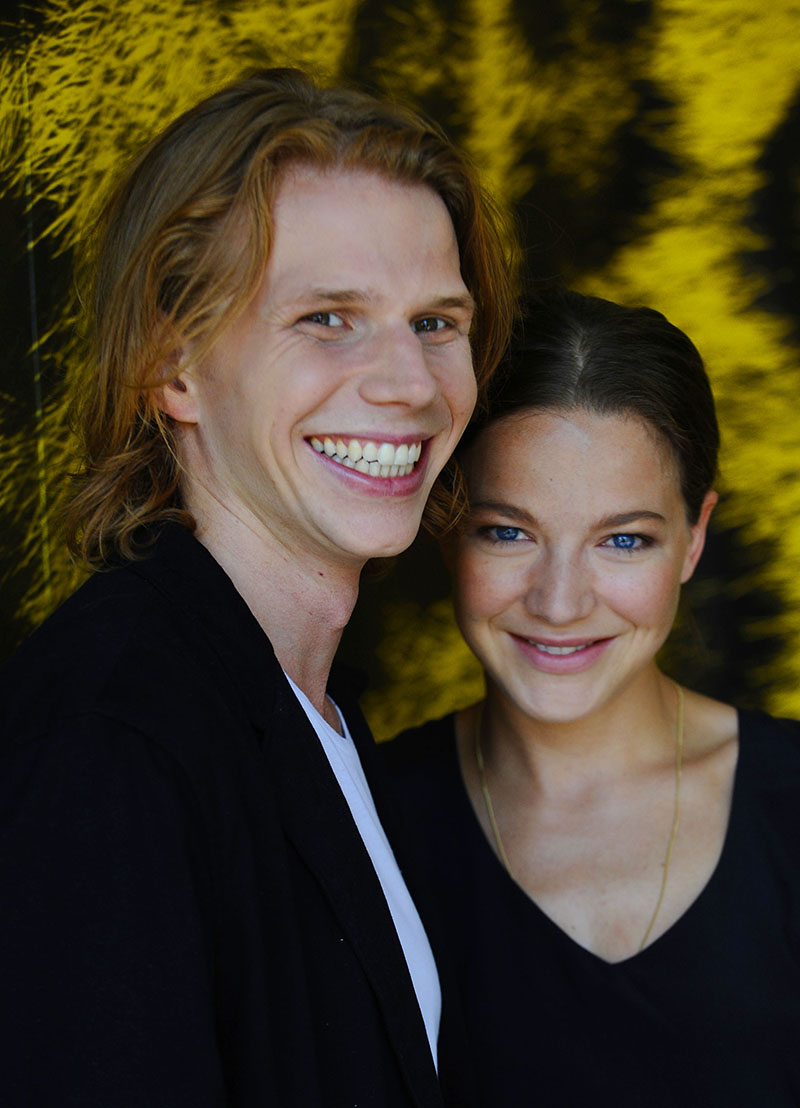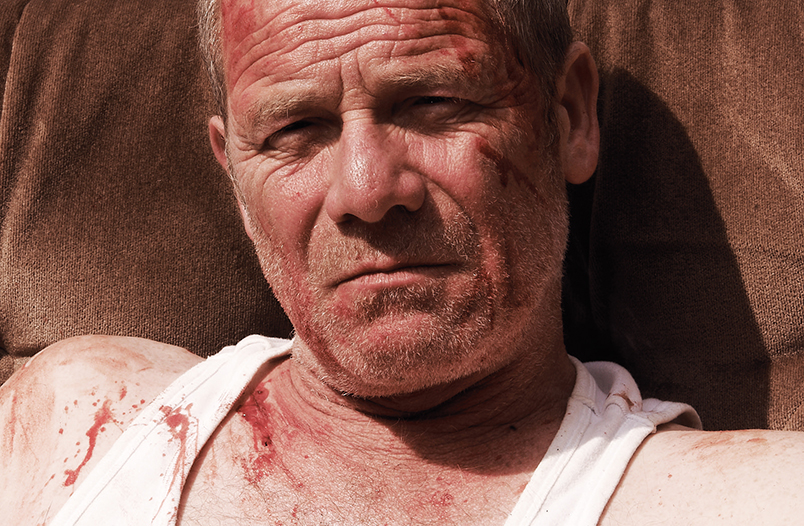Co-productions with Germany among the winners in Adana
By Martin Blaney | October 7, 2011
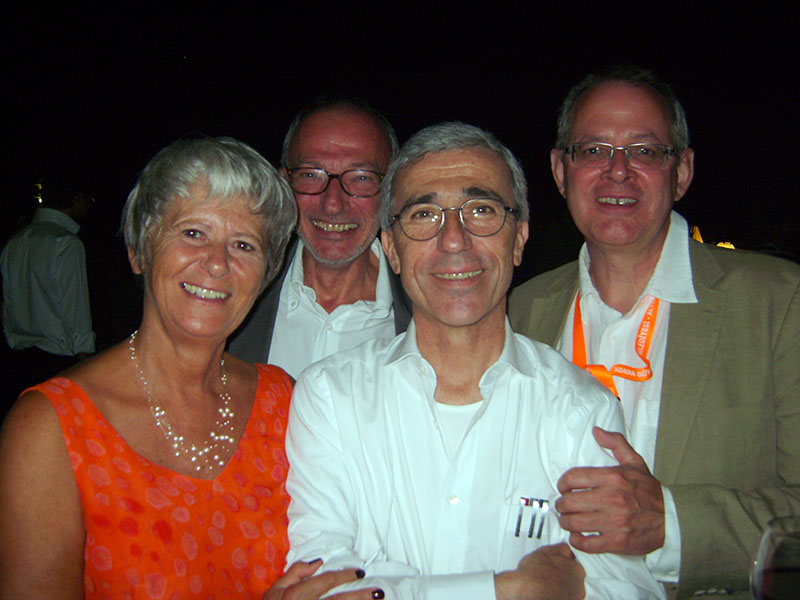
In photo: festival programmer Ahmet Boyacioglu flanked by international guests Rita Goegebeur (Cannes Film Festival), Maciej Karpinski (Polish Film Institute) and producer Thom Palmen (Botnia Film), courtesy Martin Blaney
Two Turkish films co-produced with German partners were among the winners at this year’s 18th International Golden Boll Film Festival (Sept 17-25) in Turkey’s fourth largest city Adana.
The top award for Best Film with a purse of 350,000 Turkish Lira went to Onur Ünlü’s The Extremely Tragic Story of Celal Tan and His Family. The tragicomedy about a retired constitutional law professor and his entangled family relationships also received the award for Best Screenplay as well as a special jury award created especially this year to recognise the ensemble performance of the film’s cast.
However, the largest number of prizes were attracted by Özcan Alper’s second feature Future Lasts Forever which picked up awards for Best Actor, Best Cinematography, Best Music as well as the SIYAD Turkish Film Critic Association’s Prize and the Yilmaz Güney Award in memory of the internationally renowned filmmaker who came from Adana. This co-production with France’s Arizona Film and Germany’s Unafilm (also co-producer of this year’s Berlinale competition film Our Grand Despair by Seyfi Teoman) had its premiere at the Toronto International Film Festival last month.
Topics: International Reports | Comments Off on Co-productions with Germany among the winners in Adana
“Lauter Geschenke.” Zur Premiere von MECEFF – Medias Central European Film Festival
By Dorothea Holloway | September 27, 2011
In den frühen 60er Jahren sah ich bei meinem ersten Besuch in Warschau eine wunderbare Aufführung im Jüdischen Theater unter der Leitung von Ida Kaminska, die ich nie, nie vergessen werde! Es war das melancholische Lustspiel mit Musik Goldfaden’s Traum. Und jetzt beim MECEFF vom 5. bis 11. September 2011 in Rumänien steht der knapp einstündige Dokumentarfilm Goldfaden’s Legacy (2004) in der Regie des heutigen Festival-Präsidenten Radu Gabrea im Programm.
An Hand von kostbaren Fotos, nie gesehenen Filmausschnitten, wir hören bewegende jüdische Lieder, erzählt uns Zalmen Mlotek die Geschichte vom Jüdischen Theater wie es in Rumänien anfing und zum Broadway kam und überaus innovativ die populäre Kultur der USA beeinflusste – Musical (!). Zalmen Mlotek ist der künstlerische Leiter von “The Folksbiene Yiddish Theater” in New York, gegründet 1915. Die dokumentarische, tiefe Schlichtheit, der charismatische Erzähler am Klavier und dazu einige Künstler von heute machen das Golfaden-Vermächtnis zu einem unvergesslichen Geschenk.
Vom 6. bis 10. September gab es jeden Vormittag ein Symposion, geleitet von Fachleuten, Wissenschaftlern, Filmhistorikern. Themen: The Romanian and the Central Europe’s Culture, Die Geschichte des “Yiddich Cinema” u. a. Einmal zeigte Sharon Pucker Rivo, sie ist Executive Director vom National Center for Jewish Film der Brandeis University (NCJF) in USA, Filmausschnitte, die sie aus “Brandeis” mitgebracht hatte. Wahre Schätze bekamen wir zu sehen, wahre Geschenke. Für mich besonders berührend, denn Ron hat oft von den kostbaren Filmen gesprochen, die er in Brandeis gesehen hat.
Zu den Konferenzen kam auch Helmuth Knall; er ist Lehrer an der Deutschen Schule in Medias. Von ihm bekam ich auch ein Geschenk: Schiller – Ehrung zum 200. Todestag. Studien und Aufsätze. Eine zweisprachige Ausgabe, deutsch-rumänisch, eingeleitet und herausgegeben von Maria Sass. Editura Universitatii “Lucian Blaga” din Sibiu, 2005. Ebenfalls herausgegeben von der Universitatii “Lucian Blaga” din Sibiu 2009. Erinnerungen – Ich habe drei Leben gelebt von Brigitte Niedermaier. Und noch ein drittes Buchgeschenk: The Last Pottsville Warrior. America, The Sea-Change Years. A Chronicle of an Era Novel by David Blum, 2010/2011.
Radu Gabrea und sein hervorragendes Team, wichtige Unterstützung kommt vom Bürgermeister Teodor Neamtu, hatten die gelungene Idee, auf dem Rathausplatz Freilicht-Kino zu veranstalten. “Kind und Kegel” kamen. Zur Eröffnung gab es von Percy und Felix Adlon: Mahler On The Couch. Eine glänzende Präsentation zum 100. Todesjahr – 1911 – des Komponisten. Siehe KINO – German Film No: 98 aus dem Jahre 2010. Note: In ARTE war im Mai Gustav Mahler ein Schwerpunkt. Und noch ein zweites Mal wurde Mahler On The Couch auf der großen Leinwand gezeigt; der Film bekam nämlich den Publikumspreis, wieder ein Geschenk.
Topics: International Reports, Misc. | Comments Off on “Lauter Geschenke.” Zur Premiere von MECEFF – Medias Central European Film Festival
Gabriela Dumitrescu On Choreographing Roland Emmerich’s Anonymous
By Tanja Meding | September 20, 2011
Gabriela Dumitrescu holds a BA in dance from the London Contemporary Dance School in London After graduating from LCDS, Gabriela worked as a dancer, very soon beginning to choreograph her first pieces. She moved to Berlin and began working as assistant director for a number of theater and opera directors at the Staatsoper Unter den Linden and other prestigious theaters. In addition to other projects, she choreographed Geschichten aus dem Wiener Wald at Stadttheater Basel for renowned director Fred Berndt. In 2005, Dumitrescu choreographed dance scenes for Gabriela Tscherniak’s independent feature Berlin Nights. Since 2007, she has owned and directed a dance school for children Die KinderTanzSchule. In addition, Gabriela is the proud mother of three children and co-author of a historical novel. She continues to study ballet with master teacher Jo Siska.
In 2010, Gabriela choreographed several dance scenes for Anonymous, the latest feature by Roland Emmerich (Independence Day, The Day After Tomorrow) which was filmed in Potsdam-Babelsberg, Germany. Longtime DFA member Tanja Meding met with Gabriela to talk about her experience working for a Hollywood director and her thoughts on staging dance for the screen.
Topics: German Film, International Reports, Interviews | Comments Off on Gabriela Dumitrescu On Choreographing Roland Emmerich’s Anonymous
Film Forum Zadar 2011
By Martin Blaney | September 19, 2011
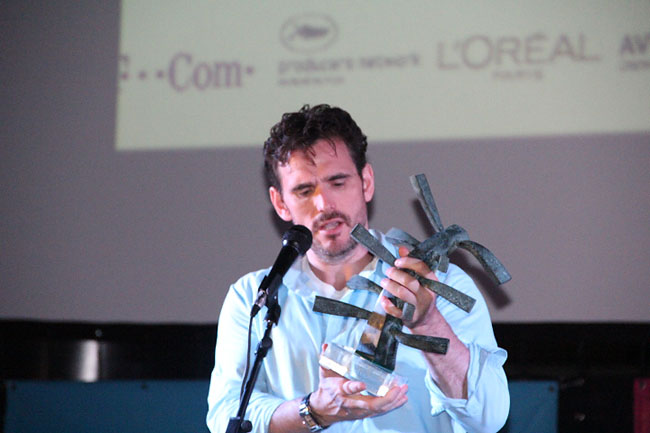
Matt Dillon receiving the sculpture award created by Jasna Bogdanovic, photo courtesy Film Forum Zadar
It’s a year ago now since Sergei Stanojkovski and his team first introduced a new event to the international festival landscape with the launching of the Film Forum Zadar in the historical port on the Adriatic an hour up the coast from Split in Northern Dalmatia. The second edition of the Film Forum was held again at the end of August – from the 23rd to 30th – just ahead of the Venice Film Festival.
This year, the week-long festivities were kicked off with the open-air screening of Terence Mallick’s Golden Palm-winner Tree Of Life and rounded off after the awards ceremony by Woody Allen’s Midnight In Paris on August 29.
An international jury headed by veteran US indie producer Jim Stark and including Romanian actress Anamaria Marinca (seen in Hans-Christian Schmid’s political thriller Storm) and Hungarian actress Orsolya Török Illyes who made such an impact last year in Bibliotheque Pascal was set the task of judging the main competition of films which ranged from Catalin Mitulescu’s Loverboy through Maiween Le Besco’s Poliss and Lisa Aschan’s She Monkey’s to Aki Kaurismäki’s Le Havre.
In addition, there were juries for the programme of documentaries and short films, and the festival’s audience was invited to vote for their favourite film to receive the Audience Award.
Topics: International Reports | Comments Off on Film Forum Zadar 2011
Weissensee – Hymne an eine außergewöhnliche TV-Serie
By Dorothea Holloway | September 3, 2011
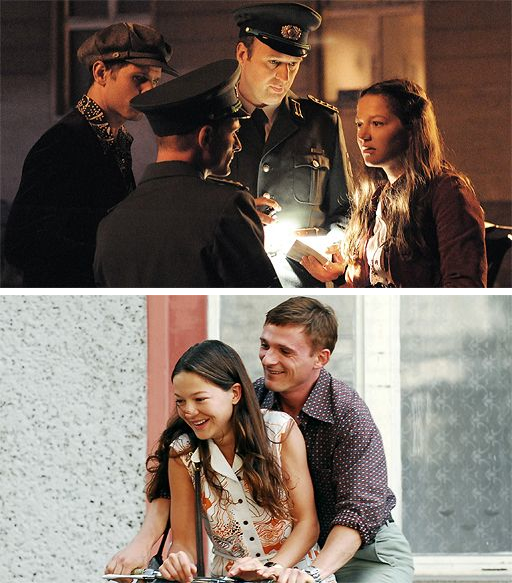
Weissensee: Julia (Hannah Hertzsprung) in einer nächtlichen Verkehrskontrolle und Julia und Martin (Florian LuKas)auf dem Fahrrad (Photos: ARD, Julia Terjung)
Das habe ich ganz selten erlebt: Ein Film, nicht übliches Format, eine ARD-Miniserie in 6 Folgen, daher auch viele Darsteller, und alle bis hin zu kleinsten Rolle (Schauspielersprech: “Es gibt keine kleinen Rollen, es gibt nur kleine Talente!”) fabelhaft besetzt! Bravo! Eine Seltenheit!
Weissensee, eine Familienserie, die in der DDR spielt. Es sind die 80er Jahre. Es geht also um Menschenschicksale, die sich vor etwa vor 30 Jahren im “anderen Teil Deutschlands” zugetragen haben. Nicht besonders spektakulär, aber absolut der Wirklichkeit, der Wahrheit verpflichtet. Ich weiß, wovon ich rede, bin alt genug und war als “Wessi” oft in der DDR: DOK-Filmfestival in Leipzig, Filmfestival in Karl-Marx-Stadt (heute wieder: Chemnitz), oft in der “Hauptstadt der DDR”, um Kinderfilme für die Berlinale auszusuchen. Außerdem gab es bei Filmfestivals in Oberhausen, Krakau und Moskau Gedankenaustausch unter Kollegen. In Weissensee (Regie: Friedemann Fromm) geht es um zwei Familien. Dunja Hausmann, Lieder-Macherin, ist absolut nicht gegen den Sozialismus, sie möchte nur mehr Freiheit für die Kunst und hofft auf eine “bessere” DDR. Sie ist unverheiratet, hat eine schöne, unbeschwerte Tochter – Julia. In der anderen Familie haben Vater Hans Kupfer, Generalmajor im Ministerium für Staatssicherheit und seine Frau Marlene zwei Söhne: Falk, der Ältere, hochintelligent, ist auch bei der Staatssicherheit und Martin ist bei der Volkspolizei.
Der junge Martin Kupfer verliebt sich nun ausgerechnet in Julia Hausmann. Aber das geht so nicht. Mutter und Tochter werden unter Druck gesetzt. Wie Katrin Sass als Lieder-Macherin Dunja Hausmann nun den Zwiespalt zwischen der Künstlerin als Dissidentin, die überwacht wird, und der Mutter, die dem Glück der Tochter nicht im Wege stehen will, gestaltet, ist zum Niederknien. Hannah Herzsprung als Tochter Julia ist ebenso eindringlich und überzeugend – unvergesslich in Vier Minuten von Chris Kraus. Ich bin gespannt auf Hell, einem Endzeitdrama Tim Fehlbaum, das in Locarno lief.
Kein Klischee stört in diesen 6 Folgen, die auch an das Drama von Romeo und Julia denken lassen. Die Familien sind zu verschieden, stehen sich fern, wenn nicht gar feindlich gegenüber. Gerade Martin Kupfer, Florian Lukas so überzeugend, weil einfach und authentisch, bringt seine Familie in schmerzliche Konflikte.
Nicht erst seit Uwe Kockisch als Commissario Brunetti in der Donna-Leon-Verfilmung brilliert, bin ich ein Fan, sondern nun um so mehr, da ich seinen Stasi-General Hans Kupfer in Weissensee gesehen habe. Das ist ein Mensch mit Verantwortung, der einem System dient, das er für lebenswert hält. Ob es dabei bleiben wird? Weissensee soll ja fortgesetzt werden. Mir fällt Gotthold Ephraim Lessing ein: In Emilia Galotti sagt der Prinz zum Maler Conti:” Der denkende Künstler ist noch eins so viel wert.”
Topics: Film Reviews, German Film | Comments Off on Weissensee – Hymne an eine außergewöhnliche TV-Serie
Strong German presence at 64th Festival del Film Locarno
By Martin Blaney | September 2, 2011
German cinema was well represented at this year’s Locarno Film Festival (August 3-13) which was Frenchman Olivier Père’s second outing as artistic director. Three German co-productions – Tawfik Abul Wael’s Last Days In Jerusalem, Julia Loktev’s The Loneliest Planet and Mia Hansen-Love’s Goodbye First Love – were invited to screen in the festival’s International Competition which was judged by a jury headed by Portuguese producer Paolo Branco and including German actress Sandra Hüller (seen recently in the lead of Brownian Movement).
Meanwhile, the Out of Competition section presented Heidi Specogna’s Carte Blanche and the much acclaimed Dreileben trilogy by Christian Petzold, Dominik Graf and Christoph Hochhäusler (president of the jury for the Filmmakers of the Present competition), while the Leopards of Tomorrow competition featured Peter Barankowski’s Addicted (Rauschgift).
In addition,the Swiss Film Critics Association SVFJ invited two German documentaries to its highly regarded programme Semaine de la Critique: Christian Stahl’s Gangsterläufer about a petty criminal Yehya from Berlin’s Neukölln district, and Matthias Bittner’s Not In My Backyard about American society’s treatment of sex offenders and predators in Miami once they have been released from prison.
Gangsterläufer, which had been six years in the making and is Stahl’s first feature-length documentary, premiered at the Max-Ophüls Preis Film Festival in January. Not In My Backyard was the first feature-length film for Bittner who is currently studying at the Filmakademie Baden-Württemberg. The film was produced with Berlin-based zischlermann filmproduktion.
Topics: International Reports | Comments Off on Strong German presence at 64th Festival del Film Locarno
Opening New Horizons in Wroclaw
By Martin Blaney | August 19, 2011

In photo, Jury member Martin Blaney with prize-winners Wilhelm and Anna Sasnal (It Looks Pretty From A Distance), courtesy Martin Blaney
Just over five hours by EuroCity train from Berlin, the Polish city of Wroclaw was host again in July for the 11th edition of the New Horizons International Film Festival which sold more than 110,000 tickets in its eleven days.
As founder Roman Gutek said in his introduction to this year’s catalogue, “from the beginning, we have consistently promoted artistic cinema – uncompromising, seeking new and interesting forms, beyond cultural and social taboo. And such films can be found in the international New Horizons competition. Artistic films, shocking the viewer, not easily comforting but staying within us, forcing us to reflect on human nature, allowing a better understanding of ourselves and the surrounding reality.”
The lineup for this year’s New Horizons International Competition certainly lived up to this remit and included Urszula Antoniak’s Code Blue, Nanouk Leopold’s Brownian Movement, Daniel Cockburn’s You Are Here.
Topics: International Reports | Comments Off on Opening New Horizons in Wroclaw
St. Petersburg plays host to 2nd Kinoforum
By Martin Blaney | August 18, 2011
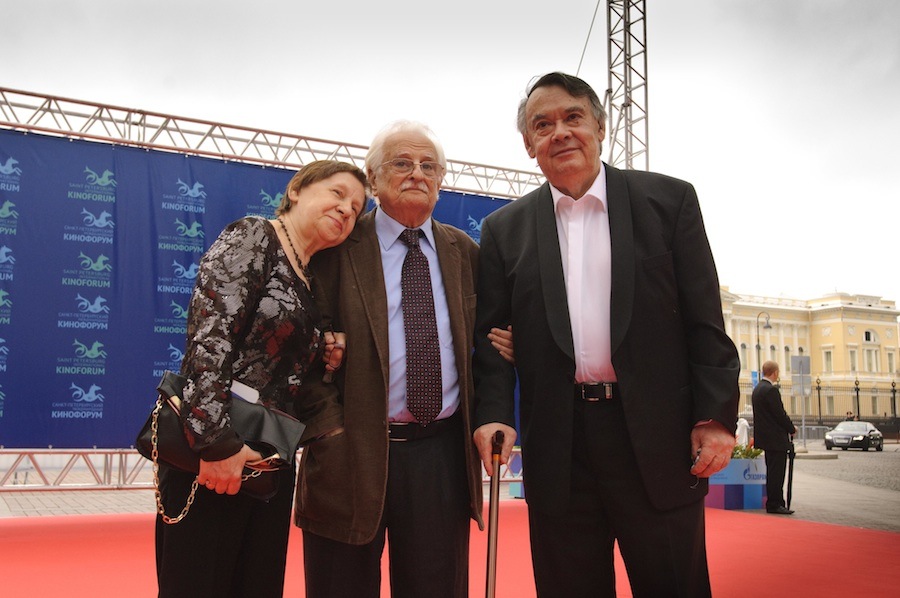
In photo: Alexey German Sr. and his wife with Marlen Khutsiyev (middle) on the Kinoforum’s red carpet, courtesy Kinoforum
Talk about good timing: the awards ceremony at the VOICES festival in Vologda had just finished on the evening of July 9 when several of the guests were whisked off for a bite to eat before being brought to the station to catch the night train to St Petersburg for the next film festival – the 2nd Saint Petersburg International Kinoforum (July 10-15).
The first edition of Kinoforum had been held in 2010 within the framework of the celebrations for the 65th Anniversary of the end of the Second World War when more than 100 feature, documentary and animation films had been shown.
It was during this new event that the idea came about of making the Kinoforum an annual event – thanks to the generous support of the government of St. Petersburg and the governor of St. Petersburg Valentina Matvienko (who is now taking up a top political appointment in Moscow) – with a good friend of KINO – German Film founders Ron and Dorothea Holloway, the veteran Russian director Alexey German Sr., serving as the festival’s president.
This year’s edition of Kinoforum had two competition programmes – Best of the the Best and The New Territories, with programme director Andrei Plakhov explaining that the Best of the Best competition would “present the award-winning films of the major international film festivals”, while The New Territories “opens new topics, new styles, new names and new tendencies.”
Topics: International Reports | Comments Off on St. Petersburg plays host to 2nd Kinoforum
Voices from Vologda
By Martin Blaney | August 1, 2011
The Moscow International Film Festival had just come to a close when another cinema event – Vologda Independent Cinema from European Screens Festival (VOICES) – opened its doors on July 5th for the second year in a town half-way between the Russian Federation capital and St Petersburg.
Part of the UNESCO’s world heritage list, Vologda was founded like Moscow in 1147 and laid claim to being the centre of Russia before finally yielding to the Great Capital.
I bridged the time between Moscow and Vologda by travelling on the hi-tech Savsan fast-speed train to St Petersburg in just four-and-a-half hours. The local filmmaker and festival curator Alexey Dmitriev kindly offered me his hospitality and accompanied me around the city which I had first visited 30 years previously as a language student.
Then it was on the night train and a journey of 11 hours to Vologda and VOICES which is dedicated to presenting the first and second films by young European directors.
After last year’s first edition which had seen Sergei Loznitsa’s My Joy winning the festival’s Grand Prix, the Ukrainian director was back this year to join the International Jury headed by the veteran UK director Hugh Hudson (Chariots Of Fire) and including Serbia’s Goran Paskaljevic, Russian actress Kseniya Rappoport, Sofia International Film Festival‘s director Stefan Kitanov, and Italian actress and model Caterina Murino (seen in Casino Royale).
2011‘s competition lineup of ten films included Michael McDonagh’s The Guard, Brigitte Sy’s Free Hands, Paddy Considine’s Tyrannosaur, and Oleg Flyangolts‘ Indifference which picked up the Grand Prix at the Kinotavr Open Russian Film Festival in Sochi in June.
Topics: International Reports, Misc. | Comments Off on Voices from Vologda
Boost for Closer Collaboration in Cinema Between Germany and Russia
By Martin Blaney | July 25, 2011
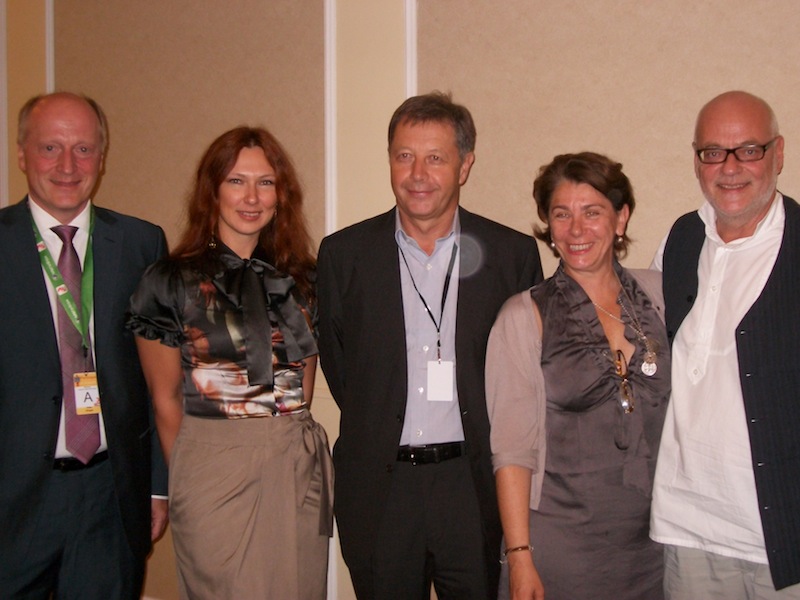
In photo: Happy funders Peter Dinges (FFA), Elena Romanova (RCF), Sergei Tolstikov (RCF), Kirsten Niehuus (Medienboard Berlin-Brandenburg), and Manfred Schmidt (MDM), courtesy of MDM
A year before the Germany-Russia Year of Culture begins and relations between the two countries in the field of cinema have received a major boost in the past few weeks.
A start was made at the Moscow Business Square during this year’s Moscow International Film Festival (MIFF) when three German film funds – the German Federal Film Board (FFA), Medienboard Berlin-Brandenburg and Mitteldeutsche Medienförderung (MDM) –joined forces with the Russia Cinema Fund (RCF) to launch an agreement to encourage the joint development of projects by German and Russian film producers.
According to the signed document, the programmes wishes “to support the development of projects with the intention to increase the number of German and Russian co-productions between Russian and German producers.” It will provide up to 150,000 Euros a year for the co-development of film projects, with the FFA and the RCF each contributing € 50,000 and Medienboard and MDM € 25,000 each.
Manfred Schmidt, who was one of the agreement’s signatories, says that it would “enable projects between German and Russian producers, directors and screenwriters to be developed at from an earlier stage, which could have chance of finding interest with audiences in both Germany and Russia as well as elsewhere in Europe.”
Meanwhile, Elena Romanova, head of RCF’s international department, points out that the joint venture with Germany makes perfect sense given the “historical relationship” of co-productions between Russia and Germany from recent years.
Germany has been the leading foreign partner for co-productions with Russia between 2006-2010, leading the field with participation in 11 of the 46 minor or major co-productions with such projects as Sergei Bodrov’s Mongol, Alexander Mindadze’s Berlinale competition film Another Saturday (see review in KINO 100) , Veit Helmer’s Baikonur and Achim von Borries’ 4 Days In May (4 Tage im Mai) which will have its premiere on the Piazza Grande in Locarno at the beginning of August.
Topics: Misc. | Comments Off on Boost for Closer Collaboration in Cinema Between Germany and Russia

